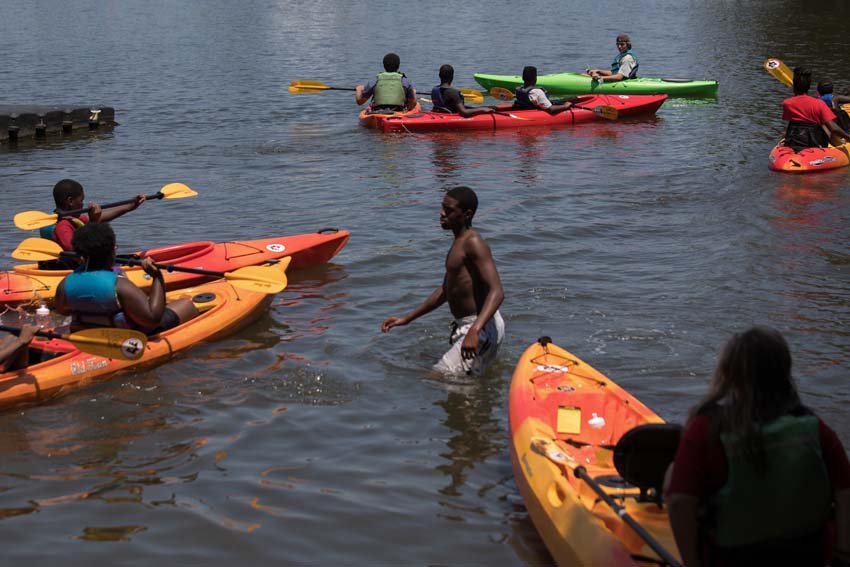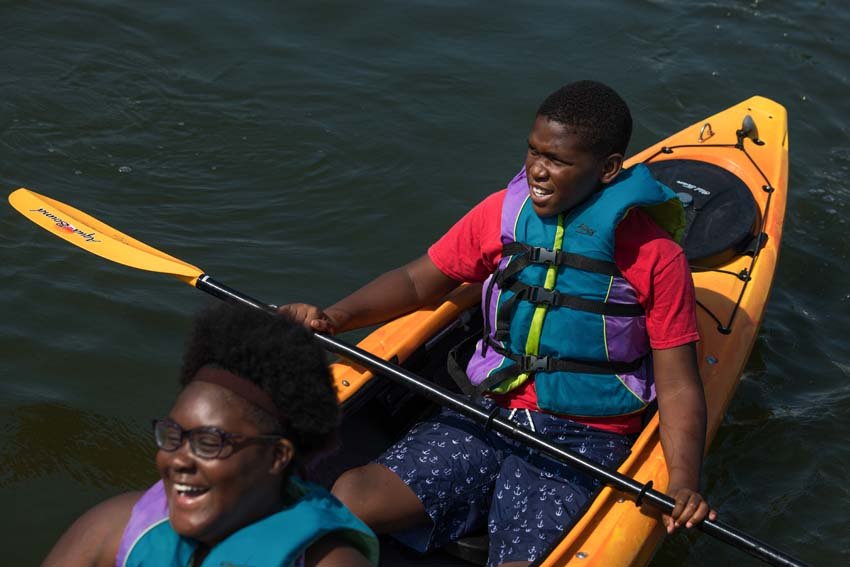+ By Leigh Glenn + Photos by Sarah Jane Holden
Seven years ago, documentary photographer Sarah Jane Holden would not have guessed that the birth of her daughter, Isabella, would have ignited her own creative fires. But during that neonatal time, during those moments of disarray, she asked herself, “What is this new life?” and “What does this new life look like?” sparking an imaginative craving. This coincided with moving back to Annapolis from Washington, DC, to raise their family—she and her husband had rented in Annapolis for a year and had come to love the people and being near the water.
Born and raised near St. Louis, Missouri, Holden came from a family of teachers. As a child, she was immersed in the arts, music especially. Her affinity to the sciences and her family’s interest in service led her to study speech-language pathology. She headed East for her clinical fellowship, which was through a private practice in the DC and Annapolis areas. There, she worked with adults—including those who had had strokes, traumatic brain injuries, or Parkinson’s disease to help them regain their ability to communicate—as well as with children with autism, developmental delays, dyslexia, and other issues. Eventually, she worked as a graduate-level instructor and clinical supervisor for speech-language pathology students at the George Washington University in DC, overseeing the handling of adult and pediatric neurology clients.
In her work, especially with families, Holden often found herself either alone or as part of a team working in an intimate setting such as a family’s home, and working with the vulnerability that comes with the situation. She had to establish trust and hone her observation and analysis skills to chart a therapeutic path for child and family. For the long-term commitment that working as a speech therapist requires, Holden also had to learn to trust in the process itself.
As a new, full-time mother, Holden needed a way to engage with the huge shift in life that that new role had brought. She had long been drawn to photography, but could not afford photography classes, and so began studying it on her own—loading up on photography books that offered instruction as she focused the camera on her family’s and her own day-to-day life. She sought out the work of women photographers, especially those who were also full-time mothers, such as Sally Mann. “Women, when they become mothers,” says Holden, “need to maintain some aspect of themselves. It’s easy to get lost in motherhood.”
Photography is a significant financial commitment, with expensive equipment and classes, she explains. But when she got to a place where she was committed to her vision, her family made the investments of time and money so that finally she could take classes.
A couple of years in to making photographs, Holden looked at her body of work and felt that something big was missing. “They all looked the same,” she says of the images. “I didn’t see my life showing up in the pictures.”
“When I first started, all I knew were family portraits at the park,” she adds. “That wasn’t my real life. My life doesn’t happen at the golden hour in the park.”

After taking an online class, “Visual Storytelling,” taught by Molly Flanagan through The Define School, everything shifted. “[It became] about weaving imagery together to tell a more purposeful story,” she says. “[The class] gave me to permission to embrace the mess and the chaos of being a young mother . . . That process of embracing helped me to refine what I see as meaningful work for myself. I think when you get into that phase, the mess and chaos, you’re still looking for those moments of connection and beauty. I was always looking for that.”
What Holden discovered is that the same traits and skills she used as a speech-language therapist—patience, respect for the process, and the ability to observe and analyze—also lend themselves to photography. And the difference between being a documentary photographer rather than a family photographer or one who focuses solely on the tenor of a particular moment stems from the desire to weave the images to tell a story. “It’s the difference between looking at images in isolation versus looking at the broader pictures that paint a narrative,” Holden says.
She recognizes that, with any process of choosing which images to share—a process that holds true across all forms of creative endeavor, there is always bias. It shows up in the way a photographer frames an image and when the shutter is clicked. “You just have to be aware of that,” she says. It’s of particular importance in documentary work, where the aim is to accurately capture what’s happening. “You get to make that choice,” says Holden.
That choice implies that two photographers shooting the same event or situation will end up with entirely different images. For Holden, finding the moments of beauty and connection is paramount. Even when her photographs represent a situation that is chaotic or potentially so, they also impart a sense of calm to the viewer. “Even if it’s a march, and everybody’s angry, everybody is not angry,” she says. “You can shoot to focus on the negative, or you can shoot to focus on moments of connection and beauty. I try to focus on those moments . . . that could potentially translate into what you call a calming quality.”
Holden’s work in social services also shaped the direction of her photographic work. She appreciates the work done by small nonprofits in the DC and Annapolis areas and sees a need that she seeks to fill. “I love learning about the work that people are doing,” she says. “I find it inspiring and enjoy meeting people who are making our communities better and stronger and reaching people who are underserved.”
Holden wants to be able to tell the stories of those organizations so that what they are doing has an even greater impact, beyond a particular event or portrait showing a person’s involvement with an organization. The Annapolis-based nonprofit Box of Rain is a good example. She volunteered to help tell the story of how the organization supports underserved youth in Annapolis.
“I tell everybody that day—it was just a day I was with them—was one of the best days of my summer,” Holden says. She felt inspired, not only by the organization’s leaders, who are invested in the children, but also by the program participants who had returned later as counselors to give back. The day Holden was there, the children kayaked up Spa Creek. “There was so much sheer joy and excitement,” she says, “It really touched my heart.”
Holden has a passion project in mind that stems from her ongoing interest in maternal health and well-being. She would like to document organizations that are helping to minimize the health disparities of pregnant women in Washington, DC, who, because of socioeconomic and racial differences, are at more risk for health challenges during pregnancy and childbirth.
Holden gained experience photodocumenting the care of mothers-to-be when she attended a photography mentorship program created by Momenta, which helps photographers improve their skills by connecting them with nonprofits whose missions need to be shared and whose stories need to be told. Momenta cofounder Jamie Rose served as Holden’s mentor, and the program took place over eight days in Puerto Rico in October 2018. The effects of Hurricane Maria the year before were still felt around the island, and some of the nonprofits that tend to pregnant women were on the verge of closing at the time of the hurricane. Somehow, they kept their doors open, Holden says, though funding is always an issue.
As part of working to document the health of mothers, children, and pregnant women in Washington, DC, Holden is researching the subject and learning to write grants. Doing the latter may help her ease some of the burden for cash-strapped nonprofits whose work she ends up photographing.
Holden has been interested in social issues since she was a child. “I’m drawn to issues surrounding women and girls,” Holden says. “What you find ultimately is that issues don’t exist in isolation,” she says. “You think it’s a singular issue you’re focusing on, but there are so many things connected with it.” For example, pregnancy and postpartum health requires access to nutritious food and healthcare, and the impacts of not having access are felt through generations. “When you are starting life this way,”—with a mother who didn’t get what she needed in terms of nutrition, vitamins, minerals and support—“you are at a disadvantage.” Holden knows that firsthand from her speech therapy work. But the issues are complex, and photography is a way to sort them out and help people to see the connections and prompt them to care. “You’re going to make better pictures if you’re more connected to the issues,” Holden says.
This is especially true for Holden, who says that, in the image-saturated culture we inhabit, taking pictures of everything can take people out of the moment. But for her, it’s the opposite—making pictures takes her more into the moment. “Most of the time, when I pick up my camera, I know it’s because I’m slowing down,” she says. “I’m stopping and I’m really seeing. It makes those experiences more vivid, more salient, and the photo is the result of that.”
She is keenly aware of her own potential impact as well. “You have to be okay with struggling with that a little bit, with asking, ‘What is the impact of the images I’m making?’” she says. “If it were my child or my family, how would I want someone to treat them? That’s always going to be a factor. You’re always trying to do justice to the people you’re working with and the people you’re encountering.”
That sentiment comes full circle as Holden considers her own family. “I struggle,” she says. “Once you enter motherhood and try to have a business and creative endeavors, it’s constantly a juggling act. I want to be a present mother, and I also want to be fulfilled as a professional, as a creative. Sometimes I do better than others.” Still, Holden hopes that, a decade from now, looking back, she’ll have been a good example—especially for daughter Isabella—of a mother who also put time and energy into building a business. “I would want her to do the same thing,” she says. █
To see more of Sarah Jane Holden’s documentary photographs, go to
www.sarahjaneholden.com/wander-portfolio












